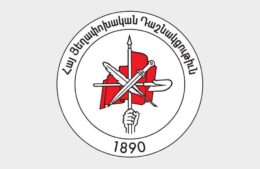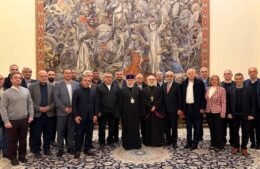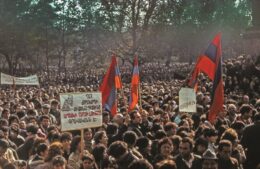Syrian-Armenian sets example for business success
- (0)
Syrian-Armenian sets example for business success –

Women’s blue jeans on mannequins are skillfully worked with sand paper to get the partly worn-out effect of almost white faded-blue. Young Syrian Armenians Aram and Shant work in silence, instead their hands run quickly, and soon mannequins dress into their next pair of jeans.
“We import the raw jeans fabric, but the rest is done here, be it designing, sewing, washing, working with sand paper, etc…” explains textile worker Harout Papazian who has moved from Aleppo to Yerevan. Here, in the suburb of Nubarashen, for a year now he has been running a small workshop. Since early this year the workshop has been producing the first made-in-Armenia Max brand jeans.
“We invited a specialist from abroad, who came and taught us all the nuances of jeans manufacturing. The idea to produce Armenian jeans was mine. If we succeed, we could also export,” says Papazian, 32. “What is the businessman’s success secret? If you sell as much as you produce, then that’s a success.”
His family roots go back to Malatia and Urfa (Western Armenia, modern-day Turkey). After the Armenian Genocide of 1915, his ancestors fled to Syria and settled in Aleppo. In 1967, his father founded a small workshop producing couch and armchair covers.
“We started out small then slowly grew, one turned two, and we started importing to other markets in Arabic countries and Russia. We had around 50 employees. The production stopped as soon as the war broke out. My parents are still in Aleppo, but will be coming to Armenia when the roads are open,” says the young man.
He says he had the idea of starting a business in Armenia yet before the Syrian war. After several visits to his motherland, he started researching the Armenian legislation to see how reasonable it was to make an investment there.
“There are many more like me, believe me, who would like to start a business, but they are waiting. I am among the first who took the courage to ‘enter the water’. It is too early to talk about results, time will show. But it is my cherished wish to grow strong in my homeland, arrange and expand my production here. The legislative field is heavy for us, but we are trying to make sense of it, there are no exceptions made for us, we work just like the locals,” he says.
The Armenian market is already familiar with his Stella brand knitted underwear and sportswear for men and women. Papazian’s little textile workshop has created 22 jobs. Syrian Armenians are among its employees and the average salary is 80,000 drams ($200).
“I decided to sell my products in Armenia, show good quality and that’s what I am doing now. My production expenses are a bit too high, but I want the locals to know they can produce high-quality goods, be it jeans or underwear or sportswear,” he says.
The young businessman opens the door into the workshop and the peculiar smell of fabric and threads immediately starts tickling the senses. Smiling women are working, their attention on the designer demonstrating the first jeans wear for children.
The next room is where the modeling takes place. Fabrics lie on tables which will later be cut and shaped in accordance with computer designs. The man in charge of this part of production is Syrian Armenian Hakob Balmanukian, who also moved to Armenia a year ago.
“See, on the computer screen you can see the shaped pieces of the jeans – the front, the back, the pockets, the belt… most importantly I have a job,” says Balmanukian.
In one corner of the room bolts of imported jeans fabric are placed. Papazian regrets that the fabric is not locally produced.
“Before starting this business I toured the place and saw many plants and workshops not functioning now. Of course, some of the owners have sold the machines, but others still have them… there are many of our Syrian Armenians or businessmen from elsewhere who, if facilitated, would restore the plants – textile, yarn, buttons, rubber, and the 70 percent of our money that goes to other countries to import raw materials would stay here, everything would be of domestic production. Let the homeland prosper, not other countries. Now only 30 percent stays in the country,” says Papazian.
He believes if there was local fabric manufacturing, he would expand faster. He pays import taxes on the border, which raises the end cost.
“We want very much to live here, and not only us, but many other Syrian Armenians are willing to settle finally in their homeland. Life is good for us here, it is beautiful in every respect, but for the job part. Many complain of the laws here, say that running businesses is not easy. Still many among them would like to start workshops to manufacture things in Armenia, in which case people wouldn’t be forced to leave their country either. It does not end with you and me. If everybody holds one another’s hand, the country will develop,” says Papazian, who is concerned about the growing migration rates.
He takes pride in the fact that business skills have been passed down to them through genes.
“Back then (1915 and later) they left everything and went to Syria, started from the scratch and made a foreign land prosper. Now again we have made it to our motherland and again from scratch, but we are used to hard work. We have learned from our ancestors – first of all trust your own strength, your own arms. Many Syrian Armenians have started founding businesses, but the field has to be favorable as well to let people adjust easily,” says Papazian.
By Gayane Mkrtchyan
ArmeniaNow reporter


















